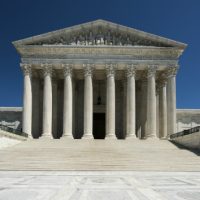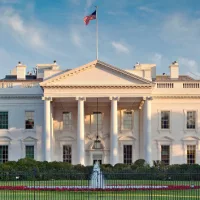
 JPecha/iStock(WASHINGTON) — What began as a traffic stop for a faulty headlight has become a potentially precedent-shattering Supreme Court case with reverberations that could reach the White House.
JPecha/iStock(WASHINGTON) — What began as a traffic stop for a faulty headlight has become a potentially precedent-shattering Supreme Court case with reverberations that could reach the White House.
When police stopped Terance Martez Gamble in Mobile, Alabama, in 2015, officers searched his car and discovered a 9 mm handgun. As a convicted felon, Gamble was forbidden under both federal and state law from possessing a gun.
Authorities prosecuted Gamble for the offense. A state judge sentenced him to one year in prison and then a federal judge tacked on three more years. He’ll be behind bars until February 2020.
On Thursday, the Supreme Court will consider whether the pair of convictions and punishments by state and federal governments is unconstitutional. Gamble’s attorneys say his treatment violates the Fifth Amendment protection against double jeopardy.
“Contrary to the text, original meaning, and purpose of the Double Jeopardy Clause — he must spend three additional years of his life behind bars,” Gamble’s attorneys wrote in their brief.
The legal arguments regarding the overlap of federal and state law enforcement have potentially big implications for a president’s pardon power.
The Gamble case is stirring speculation about the impact it could have on President Donald Trump and individuals he has hinted could soon receive pardons, including his former campaign chairman Paul Manafort.
“A win for Gamble could indirectly strengthen the President’s pardon power, by precluding a state from prosecuting an already-pardoned defendant who has gone to trial on an overlapping offense,” the independent Congressional Research Service concluded in an August 2018 analysis of the case.
A Trump pardon of Manafort after his convictions on federal bank fraud and tax evasion charges, for example, could hinder New York state authorities from prosecuting Manafort for violating state laws in committing the same offense. Special counsel Robert Mueller has been sharing information gathered during his investigation with state prosecutors, including the Manhattan District Attorney.
If the justices decide in favor of Gamble, “it could have a binding effect on the state level and expand the power of the pardon,” said JP Schnapper-Casteras, a constitutional lawyer and former Supreme Court advocate for the Legal Defense Fund.
Constitutional scholars concede the issue would likely be litigated, and a presidential pardon’s scope would only narrowly apply to the exact same crime under state law.
“It’s making a number of leaps down the road,” Schnapper-Casteras said, “but it is something to think about.”
The Fifth Amendment to the Constitution says that “no person shall … be subject for the same offense to be twice put in jeopardy of life of limb,” or double jeopardy.
For more than 150 years, however, the Supreme Court has treated state and federal governments as separate — each with a distinct set of laws that can each be enforced, even when there’s overlap. It’s known in legal circles as the “separate sovereigns” exception to the Constitution’s protection against double jeopardy.
“An individual state and the United States are two totally different sovereigns or legal entities,” explained Christopher Riano, a lecturer in constitutional law and government at Columbia University. “Your actions could violate laws at a state level and the federal level.”
The Trump administration’s Acting U.S. Solicitor General Jeffrey Wall warned in a brief to the Supreme Court that breaking that longstanding precedent would be highly unusual and disruptive.
It would “saddle courts with the confounding task of comparing different sovereigns’ laws,” Wall wrote in his brief to the court, “and threaten the finality of convictions obtained in reliance on the long-held understanding that, in cases involving separate prosecutions by different sovereigns, it does not matter which sovereign goes first.”
The Supreme Court is now taking a fresh look at whether dual prosecution for the same offense should be allowed.
“If the court were to say that the same offense concept and separate sovereigns concept no longer exist … it would be a big deal if they overturned it,” Riano said. “It would be a big shift.”
Such a decision would directly impact sentences for anyone convicted under both state and federal laws for the same offense — likely shortening time behind bars and potentially freeing Gamble. Experts say it would also force improved coordination among state and federal officials on prosecutions and punishments.
Copyright © 2018, ABC Radio. All rights reserved.















